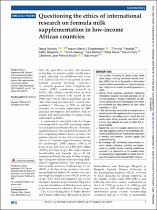| dc.contributor.author | Doherty, Tanya | |
| dc.contributor.author | Engebretsen, Ingunn Marie S | |
| dc.contributor.author | Tylleskär, Thorkild | |
| dc.date.accessioned | 2022-09-27T09:32:32Z | |
| dc.date.available | 2022-09-27T09:32:32Z | |
| dc.date.issued | 2022 | |
| dc.identifier.citation | Doherty, T. et al. (2022). Questioning the ethics of international research on formula milk supplementation in low-income African countries. BMJ Global Health, 7(9), e010227. http://dx.doi.org/10.1136/bmjgh-2022-009181 | en_US |
| dc.identifier.issn | 2059-7908 | |
| dc.identifier.uri | http://dx.doi.org/10.1136/bmjgh-2022-009181 | |
| dc.identifier.uri | http://hdl.handle.net/10566/7965 | |
| dc.description.abstract | Over the past three decades, the increase
in funding for priority public health issues
largely affecting low/middle-income countries (LMICs) has led to the growth in international research involving researchers
or research sponsors from a high-income
country (HIC) conducting research in
LMICs. The ethical considerations in such
international research were raised in the
1990s and several ethical guidelines specifically addressing international research were
published.1 2 However, in 2022, we still find
examples of research undertaken by HIC
principal investigators and funders, with no
benefit and large potential for harm, being
undertaken in LMICs. | en_US |
| dc.language.iso | en | en_US |
| dc.publisher | BMJ Publishing Group | en_US |
| dc.subject | Public health | en_US |
| dc.subject | Formula milk | en_US |
| dc.subject | Child health | en_US |
| dc.subject | Nutrition | en_US |
| dc.subject | Africa | en_US |
| dc.title | Questioning the ethics of international research on formula milk supplementation in low-income African countries | en_US |
| dc.type | Article | en_US |

